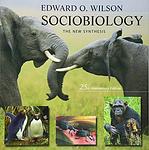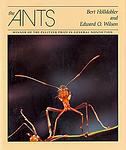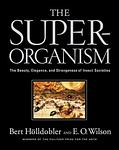E. O. Wilson
Edward Osborne Wilson, commonly known as E. O. Wilson, was an American biologist, naturalist, and writer. He was a leading authority on myrmecology, the study of ants, and was known for his work on biodiversity and sociobiology.
Books
This list of books are ONLY the books that have been ranked on the lists that are aggregated on this site. This is not a comprehensive list of all books by this author.
-
1. Sociobiology
"Sociobiology" is a comprehensive and scholarly work that explores the biological basis of social behavior in all species, including humans. The author weaves together findings from various fields such as ethology, anthropology, evolution, and genetics to propose a new discipline - sociobiology. He suggests that social behavior, including altruism, aggression, and nurturance, is not just a product of learning and environment, but also has a genetic basis. This work sparked considerable debate and controversy, particularly regarding its implications for human behavior and society.
The 2671st Greatest Book of All Time -
2. The Ants
"The Ants" is a comprehensive exploration of the biology, evolution, and behavior of ants. The book covers a wide range of topics, including the ants' origin and classification, their morphology and physiology, their communication and social organization, and their ecology. It also delves into the complex societies and intricate behaviors of these creatures, providing a detailed insight into their world. The authors use a combination of narrative and scientific explanations to make the subject accessible to both general readers and specialists.
The 4157th Greatest Book of All Time -
3. The Diversity of Life
This book is a comprehensive exploration of the variety and richness of life on Earth, written by a renowned biologist. It delves into the concept of biodiversity, examining its importance and the threats it faces. The author discusses the evolution and extinction of species, the complex interactions within ecosystems, and human impact on the environment. The book is a passionate plea for the conservation of the planet's diverse species and ecosystems.
The 4553rd Greatest Book of All Time -
4. The Insect Societies
The book is a comprehensive study of the complex social structures and behaviors of insects, such as ants, bees, wasps, and termites. It delves into the intricate organization of their societies, exploring how these creatures communicate, reproduce, and function within their ecosystems. The author examines the evolutionary biology that has led to the diverse forms of social organization observed in insect species, shedding light on the parallels between human societies and those of these small, yet incredibly sophisticated, creatures. Through detailed observations and scientific analysis, the book provides a deep understanding of the principles governing social behavior in the insect world.
The 5708th Greatest Book of All Time -
5. Naturalist
"Naturalist" is a memoir that delves into the life and career of a renowned biologist, tracing his development from a nature-obsessed child to a distinguished scientist. The book offers an intimate look at his groundbreaking work in the field of sociobiology, his deep fascination with ant species, and his broader studies on biodiversity and conservation. Throughout, the author reflects on the evolution of his own scientific philosophy and the intrinsic human connection to nature, advocating passionately for the preservation of our biological heritage. This autobiography not only highlights personal achievements and the challenges faced but also serves as a compelling argument for the importance of scientific curiosity and environmental stewardship.
The 6437th Greatest Book of All Time -
6. On Human Nature
This book delves into the biological origins of human behavior, suggesting that they are largely derived from our evolutionary past. The author explores how our species' inherent traits and instincts, including aggression, sexual conduct, and moral instincts, are influenced by our genetic makeup. He also discusses the implications of these ideas for issues like politics, sexuality, religion, and ethics, challenging the reader to reconsider the nature versus nurture debate.
The 6663rd Greatest Book of All Time





